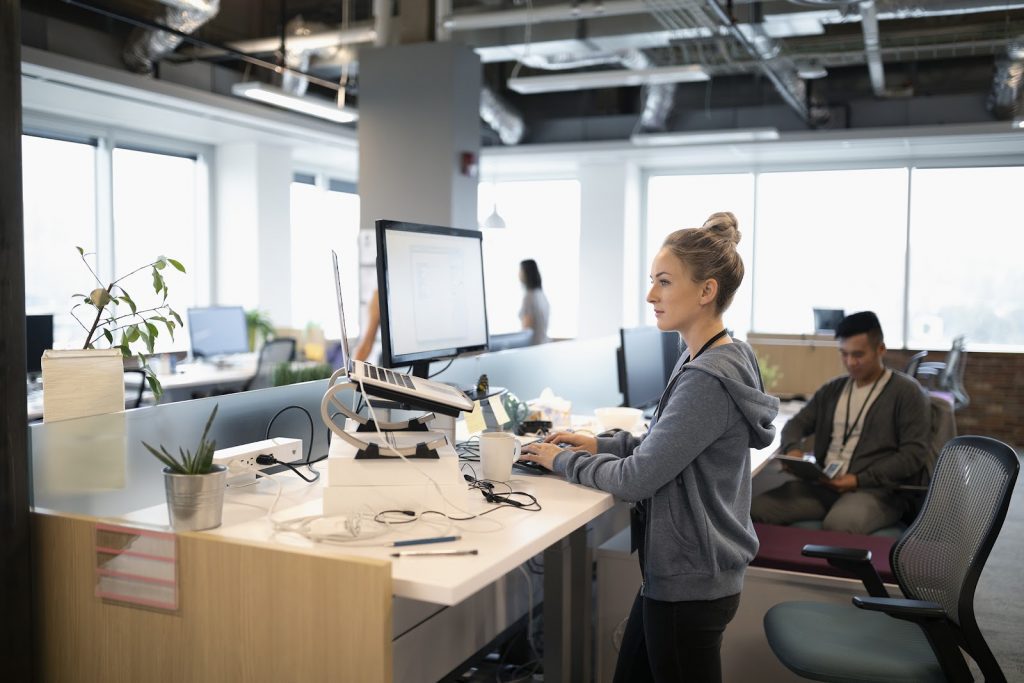
Standing Desk 101: Are there health benefits to a Sit-Stand Desk?
Standing desks are increasingly gaining traction as employers look to improve wellness in the workplace. As physiotherapists, we’re no strangers to seeing the consequences of poor posture, from fatigue to chronic back pain, neck tightness and worse.
With more people sitting longer at computers and other workstations, the key to preventing poor posture starts in the workplace. The longer you stay seated, the more likely you are to let posture slide, leading to episodes of back and neck pain. Over time, long bouts of sitting can lead to significant spine issues.
We’ve previously suggested some exercises to help with posture, but it might be time to consider a standing (or sit-stand) desk at work. Here are some important things to keep in mind if you’re thinking about making the transition:
Benefits of Standing
Physical health
Sitting for prolonged periods of time can increase a person’s chances of developing numerous health problems including cardiovascular disease and cancer (specifically colon and breast cancer). It can also negatively affect the body’s ability to regulate glucose levels, which over time can potentially lead to type two diabetes.
Pain management
It is easier to slouch when you’re sitting, which contributes to back and neck pain. Standing, on the other hand, naturally improves your posture and therefore prevents this pain. Additionally, your back, neck, hip, core and leg muscles are all engaged while you stand, which prevents them from becoming weaker.
Work performance
After working at a standing desk, some people report feeling more productive. Some also found it easier to concentrate, which can be explained by the fact that standing allows blood to be pumped around your body more easily. Multiple studies have also found that people who use standing desks feel more energised, which would also contribute to the amount and quality of work they are able to complete. Standing has also been shown to increase endorphins, or ‘happy hormones’, therefore improving people’s mood and mental health.
Burning calories
One of the common reasons people invest in a standing desk is because they believe it can help them lose weight. However, different studies have resulted in conflicting results in regard to whether the difference between sitting and standing is enough to contribute to weight loss. While many find that standing can burn up to 50 more calories an hour, research conducted by the Journal of Physical Activity and Health, which involved accurately measuring energy expenditure via oxygen consumption, found that sitting burned 80 calories per hour, while standing only burned 8 more. Therefore, standing desks may not necessarily contribute to weight loss – however as demonstrated, they do provide many other important benefits.
Things to be mindful of
Transition gently
Standing up all day when you aren’t used to it can be a shock to the body, and can cause its own problems such as back, leg and foot pain. When you transition to a standing desk, it is best to start with a few small periods of standing throughout the day (roughly 30 to 60 minutes in total), and gradually increase the duration of your standing periods until you find a sitting/standing balance that works for you and your body.
Interrupting efficiency
Many experts suggest using a timer to remind yourself to switch from sitting to standing (or vice versa). However, the noise of the timer and the transition itself could potentially interrupt your focus, and therefore decrease your efficiency. One possible way to avoid this could be to choose a task that you expect to take roughly as long as your desired sitting/standing period, and sit/stand until the task is complete so it is not interrupted.
Ultimately, the best way to keep your body healthy is to combine sitting, standing and movement throughout the day. We encourage you to do some further research if you’re considering a standing desk. Ergolink talks you through how to choose one here.
If you need help with pain or immobility to get you moving again, or need advice setting up a workspace that works for your conditions, book in with one of our exercise, physio, or pain specialists via 1300 012 273 or head to our website and book a session at your nearest clinic.
